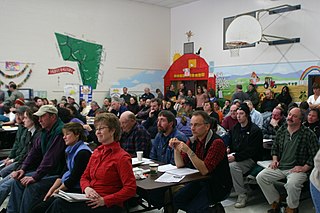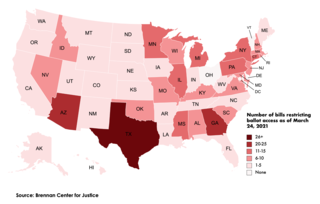
Town meeting, also known as an "open town meeting," is a form of local government in which eligible town residents can directly participate in an assembly which determines the governance of their town. Unlike representative town meeting where only elected representatives can participate in the governing assembly, any town voter may participate in an open town meeting. This form is distinct from town hall meetings held by elected officials to communicate with their constituents, which have no decision-making power.
Electronic voting is voting that uses electronic means to either aid or take care of casting and counting ballots including voting time.
Electoral fraud, sometimes referred to as election manipulation, voter fraud, or vote rigging, involves illegal interference with the process of an election, either by increasing the vote share of a favored candidate, depressing the vote share of rival candidates, or both. It differs from but often goes hand-in-hand with voter suppression. What exactly constitutes electoral fraud varies from country to country, though the goal is often election subversion.

Dixville Notch is an unincorporated community in Dixville township, Coos County, New Hampshire, United States. The population of the township, all of whom live in Dixville Notch, was 4 as of the 2020 census. The village is known for being the first place to declare its results during the New Hampshire presidential primary. It is located in the northern part of the state, approximately 20 miles (32 km) south of the border with the Canadian province of Quebec. The village is situated at about 1,800 feet (550 m) above sea level at the base of mountains.

The secret ballot, also known as the Australian ballot, is a voting method in which a voter's identity in an election or a referendum is anonymous. This forestalls attempts to influence the voter by intimidation, blackmailing, and potential vote buying. This system is one means of achieving the goal of political privacy.

A polling place is where voters cast their ballots in elections. The phrase polling station is also used in American English and British English, although a polling place is the building and polling station is the specific room where voters cast their votes. A polling place can contain one or more polling stations. In Australian English, "polling place" is used. Americans also use the term voting precinct in some states.

A ballot box is a temporarily sealed container, usually a square box though sometimes a tamper resistant bag, with a narrow slot in the top sufficient to accept a ballot paper in an election but which prevents anyone from accessing the votes cast until the close of the voting period. A ballot drop box allows voters who have received a ballot by mail to submit it for counting in a self-service fashion. In the United States, ballot boxes are usually sealed after the end of polling, and transported to vote-counting centers.
An absentee ballot is a vote cast by someone who is unable or unwilling to attend the official polling station to which the voter is normally allocated. Methods include voting at a different location, postal voting, proxy voting and online voting. Increasing the ease of access to absentee ballots is seen by many as one way to improve voter turnout through convenience voting, though some countries require that a valid reason, such as infirmity or travel, be given before a voter can participate in an absentee ballot. Early voting overlaps with absentee voting. Early voting includes votes cast before the official election day(s), by mail, online or in-person at voting centers which are open for the purpose. Some places call early in-person voting a form of "absentee" voting, since voters are absent from the polling place on election day.
Early voting, also called advance polling or pre-poll voting, is a convenience voting process by which voters in a public election can vote before a scheduled election day. Early voting can take place remotely, such as via postal voting, or in person, usually in designated early voting polling stations. The availability and time periods for early voting vary among jurisdictions and types of election. The goals of early voting are usually to increase voter participation, relieve congestion at polling stations on election day, and avoid possible discrimination against people with work and travel schedules that may effectively prohibit them from getting to the polls during the hours provided in a single election day.

Postal voting is voting in an election where ballot papers are distributed to electors by post, in contrast to electors voting in person at a polling station or electronically via an electronic voting system.

Elections in Kazakhstan are held on a national level to elect a President and the Parliament, which is divided into two bodies, the Majilis and the Senate. Local elections for maslihats are held every five years.
Elections in Israel are based on nationwide proportional representation. The electoral threshold is currently set at 3.25%, with the number of seats a party receives in the Knesset being proportional to the number of votes it receives. The Knesset is elected for a four-year term, although most governments have not served a full term and early elections are a frequent occurrence. Israel has a multi-party system based on coalition governments as no party has ever won a majority of seats in a national election, although the Alignment briefly held a majority following its formation by an alliance of several different parties prior to the 1969 elections. Suffrage is universal to all Israeli citizens above the age of 18. Israeli citizens living abroad have to travel to Israel in order to vote. Voting booths are made available on Israeli ships. Elections are overseen by the Central Elections Committee, and are held according to the Knesset Elections Law. Israel was ranked 47th most electoral democratic country in the world and the most electoral democratic country in the Middle East according to V-Dem Democracy indices in 2023.
Electoral reform in Texas refers to efforts to change the voting and election laws in the State of Texas.

Andrew Scott Hanen is an American attorney and jurist serving as a United States district judge of the United States District Court for the Southern District of Texas.

Jason L. McCoy is the former mayor of Vernon, Connecticut, and a trial lawyer. In 2009, McCoy was elected to his first term in 2007. McCoy was re-elected as mayor. He had served on the Vernon Town Council and was the deputy mayor of Vernon from 2005 to 2007. In 2009, McCoy was one of six mayors in Connecticut chosen by the Governor M. Jodi Rell to work closely with state officials and lawmakers to identify savings and recommend mandate relief to help close Connecticut's state budget shortfall. McCoy served as mayor of a municipality that holds town meetings to pass the mayor's yearly proposed municipal budget, which can then be sent to referendum for approval by privately cast ballot. During McCoy's two terms as mayor of Vernon he proposed and passed four municipal budgets. The Town of Vernon municipal budgets during McCoy's terms as mayor resulted in the municipal tax rate or mil rate needed to fund the municipal budget being reduced in the 2008–09, 2009–10 budgets, the 2010–11 tax rate or mil rate remained the same. In the 2011–12 budget the tax rate was cut which resulted in a taxes cut to the taxpayers in the Town of Vernon, Connecticut. The 2011–12 budget proposal was passed and adopted at the annual town meeting as opposed to being sent to referendum.
Voter suppression in the United States consists of various legal and illegal efforts to prevent eligible citizens from exercising their right to vote. Such voter suppression efforts vary by state, local government, precinct, and election. Voter suppression has historically been used for racial, economic, gender, age and disability discrimination. After the American Civil War, all African-American men were granted voting rights, but poll taxes or language tests were used to limit and suppress the ability to register or cast a ballot. The Civil Rights Act of 1964 and the Voting Rights Act of 1965 improved voting access. Since the beginning of voter suppression efforts, proponents of these laws have cited concerns over electoral integrity as a justification for various restrictions and requirements, while opponents argue that these constitute bad faith given the lack of voter fraud evidence in the United States.
Ballot collecting, also known as "ballot harvesting" or "ballot chasing", is the gathering and submitting of completed absentee or mail-in voter ballots by third-party individuals, volunteers or workers, rather than submission by voters themselves directly to ballot collection sites. It occurs in some areas of the U.S. where voting by mail is common, but some other states have laws restricting it.

The 2020 United States presidential election in Texas was held on Tuesday, November 3, 2020, as part of the 2020 United States presidential election in which all 50 states plus the District of Columbia participated. Texas voters chose 38 electors to represent them in the Electoral College. In a popular vote the Republican Party's nominee, incumbent President Donald Trump, and running mate Vice President Mike Pence won all the electors against the Democratic Party's nominee, former Vice President Joe Biden, and his running mate California Senator Kamala Harris.

Following the 2020 United States presidential election and the unsuccessful attempts by Donald Trump and various other Republican officials to overturn it, Republican lawmakers initiated a sweeping effort to make voting laws more restrictive within several states across the country. According to the Brennan Center for Justice, as of October 4, 2021, more than 425 bills that would restrict voting access have been introduced in 49 states—with 33 of these bills enacted across 19 states so far. The bills are largely centered around limiting mail-in voting, strengthening voter ID laws, shortening early voting, eliminating automatic and same-day voter registration, curbing the use of ballot drop boxes, and allowing for increased purging of voter rolls. Republicans in at least eight states have also introduced bills that would give lawmakers greater power over election administration after they were unsuccessful in their attempts to overturn election results in swing states won by Democratic candidate Joe Biden in the 2020 election. The efforts garnered press attention and public outrage from Democrats, and by 2023 Republicans had adopted a more "under the radar" approach to achieve their goals.
The Election Integrity Act of 2021, originally known as the Georgia Senate Bill 202, is a law in the U.S. state of Georgia overhauling elections in the state. It replaced signature matching requirements on absentee ballots with voter identification requirements, limits the use of ballot drop boxes, expands in-person early voting, bars officials from sending out unsolicited absentee ballot request forms, reduces the amount of time people have to request an absentee ballot, increases voting stations or staff and equipment where there have been long lines, makes it a crime for outside groups to give free food or water to voters waiting in line, gives the Georgia General Assembly greater control over election administration, and shortens runoff elections, among other provisions.










